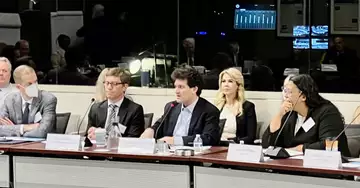FTX founder and CEO Sam Bankman-Fried stood before a room full of derivatives industry bigwigs and regulators Wednesday to argue in favor of his company's proposal to clear transactions directly. He also illustrated the potential divide between the two sides by tweeting comments during the discussion.
The Commodity Futures Trading Commission (CFTC) hosted the discussion on the possibility of cutting out intermediaries in the industry to overhaul derivatives trading, which FTX is the first company in the U.S. to seek. As the CFTC considers the company's request, it invited industry stakeholders and academics to discuss the issue in a large room in its Washington, D.C., offices, where the agency has often held discussions on industry developments.
"Frankly, there were a lot of things said that I think are pretty wrong, and a lot of things said that are pretty helpful, and I really appreciate the latter," Bankman-Fried said after an initial round of comments on the topic, known as "non-brokered clearing." The basic idea is that his firm seeks the ability to clear its clients' margin-backed derivatives contracts directly, without traditional intermediaries, with Bankman-Fried frequently touting the benefits for managing market stress.
During the discussion, the existing industry structure was defended as "quite adaptable" to volatile situations by Sean Downey, executive director of clearing, risk and capital policy at CME Group, the world's leading derivatives exchange. Downey also criticized any new system that would rely on algorithms rather than capital buffers, arguing that the former would bring its own dangers. "We've seen this movie before, and we've seen it recently," he said, referring to the recent collapse of TerraUSD (UST).
Several derivatives industry representatives also expressed concern about the use of automated liquidations in response to real-time market tensions, as envisioned in FTX.US' application to the CFTC.
Gerry Corcoran, CEO of R.J. O'Brien & Associates, called the use of such liquidations a "weapon of mass destruction" that will trigger "a cycle of flash crashes" without the human intervention common in today's market that could limit dramatic swings that computers could enable.
For his part, Bankman-Fried responded to dozens of points on Twitter as the discussion dragged on for hours. He returned to the floor debate to defend his views on how to handle customers' positions on a live basis, something his company has done in other countries.
"If you're able to measure collateral and the size of positions in real time, you can take a customer position down only when you really need to, and at the same time you can do it before you create systemic risk," he said. "There are pros and cons, but I think there are a lot of advantages."

